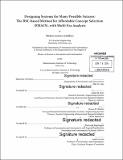| dc.contributor.advisor | Donna H. Rhodes. | en_US |
| dc.contributor.author | Schaffner, Michael Andrew | en_US |
| dc.contributor.other | Massachusetts Institute of Technology. Department of Aeronautics and Astronautics. | en_US |
| dc.date.accessioned | 2014-10-08T15:29:42Z | |
| dc.date.available | 2014-10-08T15:29:42Z | |
| dc.date.copyright | 2014 | en_US |
| dc.date.issued | 2014 | en_US |
| dc.identifier.uri | http://hdl.handle.net/1721.1/90796 | |
| dc.description | Thesis: S.M., Massachusetts Institute of Technology, Department of Aeronautics and Astronautics, 2014. | en_US |
| dc.description | Cataloged from PDF version of thesis. | en_US |
| dc.description | Includes bibliographical references (pages 175-178). | en_US |
| dc.description.abstract | The current downward trend in funding for U.S. defense systems seems to be on a collision course with the state of the practice in systems engineering, which typically results in the increased pace and scale of capabilities and resultantly increased cost of complex national defense systems. Recent advances in the state of the art in systems engineering methodology can be leveraged to address this growing challenge. The present work leverages advanced constructs and methods for early-phase conceptual design of complex systems, when committed costs are still low and management influence is still high. First, a literature review is presented of the topics relevant to this work, including approaches to the design of affordable systems, assumptions and methods of exploratory modeling, and enabling techniques to help mitigate the computational challenges involved. The types, purposes, and limits of early-phase, exploratory models are then elucidated. The RSC-based Method for Affordable Concept Selection (RMACS) is described, which comprises nine processes in the three main thrusts of information gathering, evaluation, and analysis. The method is then applied to a naval ship case example, described as the Next-Generation Combat Ship, with representational information outputs and discussions of affordability with respect to each process. The ninth process, Multi-Era Analysis (MERA), is introduced and explicated, including required and optional informational components, temporal and change-related considerations, required and optional activities involved, and the potential types of outputs from the process. The MERA process is then applied to a naval ship case example similar to that of the RMACS application, but with discrete change options added to enable a tradespace network. The seven activities of the MERA process are demonstrated, with the salient outputs of each given and discussed. Additional thoughts are presented on MERA and RMACS, and 8 distinct areas are identified for further research in the MERA process, along with a brief description of the directions that such research might take. It is concluded that the affordability of complex systems can be better enabled through a conceptual design method that incorporates MERA as well as metrics such as Multi-Attribute Expense, Max Expense, and Expense Stability. It is also found that affordability of changeable systems can be better enabled through the use of existing path-planning algorithms in efficient evaluation and analysis of long-term strategies. Finally, it is found that MERA enables the identification and analysis of path-dependent considerations related to designs, epochs, strategies, and change options, in many possible futures. | en_US |
| dc.description.statementofresponsibility | by Michael Andrew Schaffner. | en_US |
| dc.format.extent | 192 pages | en_US |
| dc.language.iso | eng | en_US |
| dc.publisher | Massachusetts Institute of Technology | en_US |
| dc.rights | M.I.T. theses are protected by copyright. They may be viewed from this source for any purpose, but reproduction or distribution in any format is prohibited without written permission. See provided URL for inquiries about permission. | en_US |
| dc.rights.uri | http://dspace.mit.edu/handle/1721.1/7582 | en_US |
| dc.subject | Aeronautics and Astronautics. | en_US |
| dc.title | Designing systems for many possible futures : the RSC-based method for affordable concept selection (RMACS), with multi-era analysis | en_US |
| dc.type | Thesis | en_US |
| dc.description.degree | S.M. | en_US |
| dc.contributor.department | Massachusetts Institute of Technology. Department of Aeronautics and Astronautics | |
| dc.identifier.oclc | 891581990 | en_US |
